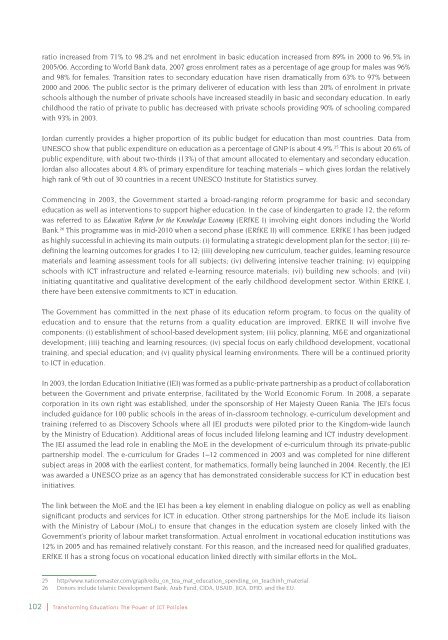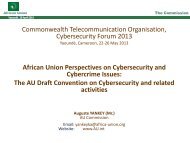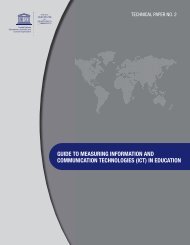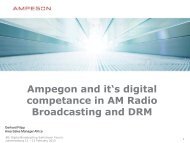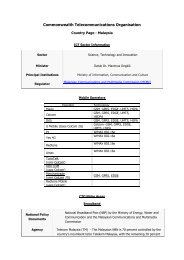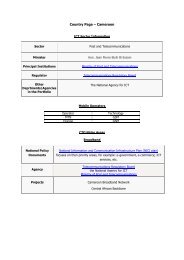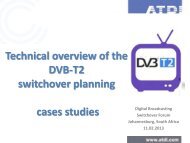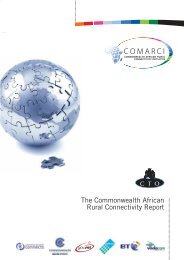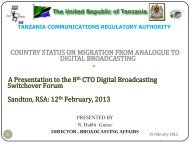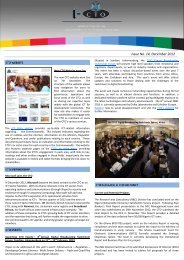Transforming education: the power of ICT policies - Commonwealth ...
Transforming education: the power of ICT policies - Commonwealth ...
Transforming education: the power of ICT policies - Commonwealth ...
You also want an ePaper? Increase the reach of your titles
YUMPU automatically turns print PDFs into web optimized ePapers that Google loves.
atio increased from 71% to 98.2% and net enrolment in basic <strong>education</strong> increased from 89% in 2000 to 96.5% in<br />
2005/06. According to World Bank data, 2007 gross enrolment rates as a percentage <strong>of</strong> age group for males was 96%<br />
and 98% for females. Transition rates to secondary <strong>education</strong> have risen dramatically from 63% to 97% between<br />
2000 and 2006. The public sector is <strong>the</strong> primary deliverer <strong>of</strong> <strong>education</strong> with less than 20% <strong>of</strong> enrolment in private<br />
schools although <strong>the</strong> number <strong>of</strong> private schools have increased steadily in basic and secondary <strong>education</strong>. In early<br />
childhood <strong>the</strong> ratio <strong>of</strong> private to public has decreased with private schools providing 90% <strong>of</strong> schooling compared<br />
with 93% in 2003.<br />
Jordan currently provides a higher proportion <strong>of</strong> its public budget for <strong>education</strong> than most countries. Data from<br />
UNESCO show that public expenditure on <strong>education</strong> as a percentage <strong>of</strong> GNP is about 4.9%. 25 This is about 20.6% <strong>of</strong><br />
public expenditure, with about two-thirds (13%) <strong>of</strong> that amount allocated to elementary and secondary <strong>education</strong>.<br />
Jordan also allocates about 4.8% <strong>of</strong> primary expenditure for teaching materials – which gives Jordan <strong>the</strong> relatively<br />
high rank <strong>of</strong> 9th out <strong>of</strong> 30 countries in a recent UNESCO Institute for Statistics survey.<br />
Commencing in 2003, <strong>the</strong> Government started a broad-ranging reform programme for basic and secondary<br />
<strong>education</strong> as well as interventions to support higher <strong>education</strong>. In <strong>the</strong> case <strong>of</strong> kindergarten to grade 12, <strong>the</strong> reform<br />
was referred to as Education Reform for <strong>the</strong> Knowledge Economy (ERfKE I) involving eight donors including <strong>the</strong> World<br />
Bank. 26 This programme was in mid-2010 when a second phase (ERfKE II) will commence. ERfKE I has been judged<br />
as highly successful in achieving its main outputs: (i) formulating a strategic development plan for <strong>the</strong> sector; (ii) redefi<br />
ning <strong>the</strong> learning outcomes for grades 1 to 12; (iii) developing new curriculum, teacher guides, learning resource<br />
materials and learning assessment tools for all subjects; (iv) delivering intensive teacher training; (v) equipping<br />
schools with <strong>ICT</strong> infrastructure and related e-learning resource materials; (vi) building new schools; and (vii)<br />
initiating quantitative and qualitative development <strong>of</strong> <strong>the</strong> early childhood development sector. Within ERfKE I,<br />
<strong>the</strong>re have been extensive commitments to <strong>ICT</strong> in <strong>education</strong>.<br />
The Government has committed in <strong>the</strong> next phase <strong>of</strong> its <strong>education</strong> reform program, to focus on <strong>the</strong> quality <strong>of</strong><br />
<strong>education</strong> and to ensure that <strong>the</strong> returns from a quality <strong>education</strong> are improved. ERfKE II will involve fi ve<br />
components: (i) establishment <strong>of</strong> school-based development system; (ii) policy, planning, M&E and organizational<br />
development; (iii) teaching and learning resources; (iv) special focus on early childhood development, vocational<br />
training, and special <strong>education</strong>; and (v) quality physical learning environments. There will be a continued priority<br />
to <strong>ICT</strong> in <strong>education</strong>.<br />
In 2003, <strong>the</strong> Jordan Education Initiative (JEI) was formed as a public-private partnership as a product <strong>of</strong> collaboration<br />
between <strong>the</strong> Government and private enterprise, facilitated by <strong>the</strong> World Economic Forum. In 2008, a separate<br />
corporation in its own right was established, under <strong>the</strong> sponsorship <strong>of</strong> Her Majesty Queen Rania. The JEI’s focus<br />
included guidance for 100 public schools in <strong>the</strong> areas <strong>of</strong> in-classroom technology, e-curriculum development and<br />
training (referred to as Discovery Schools where all JEI products were piloted prior to <strong>the</strong> Kingdom-wide launch<br />
by <strong>the</strong> Ministry <strong>of</strong> Education). Additional areas <strong>of</strong> focus included lifelong learning and <strong>ICT</strong> industry development.<br />
The JEI assumed <strong>the</strong> lead role in enabling <strong>the</strong> MoE in <strong>the</strong> development <strong>of</strong> e-curriculum through its private-public<br />
partnership model. The e-curriculum for Grades 1–12 commenced in 2003 and was completed for nine different<br />
subject areas in 2008 with <strong>the</strong> earliest content, for ma<strong>the</strong>matics, formally being launched in 2004. Recently, <strong>the</strong> JEI<br />
was awarded a UNESCO prize as an agency that has demonstrated considerable success for <strong>ICT</strong> in <strong>education</strong> best<br />
initiatives.<br />
The link between <strong>the</strong> MoE and <strong>the</strong> JEI has been a key element in enabling dialogue on policy as well as enabling<br />
signifi cant products and services for <strong>ICT</strong> in <strong>education</strong>. O<strong>the</strong>r strong partnerships for <strong>the</strong> MoE include its liaison<br />
with <strong>the</strong> Ministry <strong>of</strong> Labour (MoL) to ensure that changes in <strong>the</strong> <strong>education</strong> system are closely linked with <strong>the</strong><br />
Government’s priority <strong>of</strong> labour market transformation. Actual enrolment in vocational <strong>education</strong> institutions was<br />
12% in 2005 and has remained relatively constant. For this reason, and <strong>the</strong> increased need for qualifi ed graduates,<br />
ERfKE II has a strong focus on vocational <strong>education</strong> linked directly with similar efforts in <strong>the</strong> MoL.<br />
25 http//www.nationmaster.com/graph/edu_on_tea_mat_<strong>education</strong>_spending_on_teachinh_material.<br />
26 Donors include Islamic Development Bank, Arab Fund, CIDA, USAID, JICA, DFID, and <strong>the</strong> EU.<br />
102 | <strong>Transforming</strong> Education: The Power <strong>of</strong> <strong>ICT</strong> Policies


